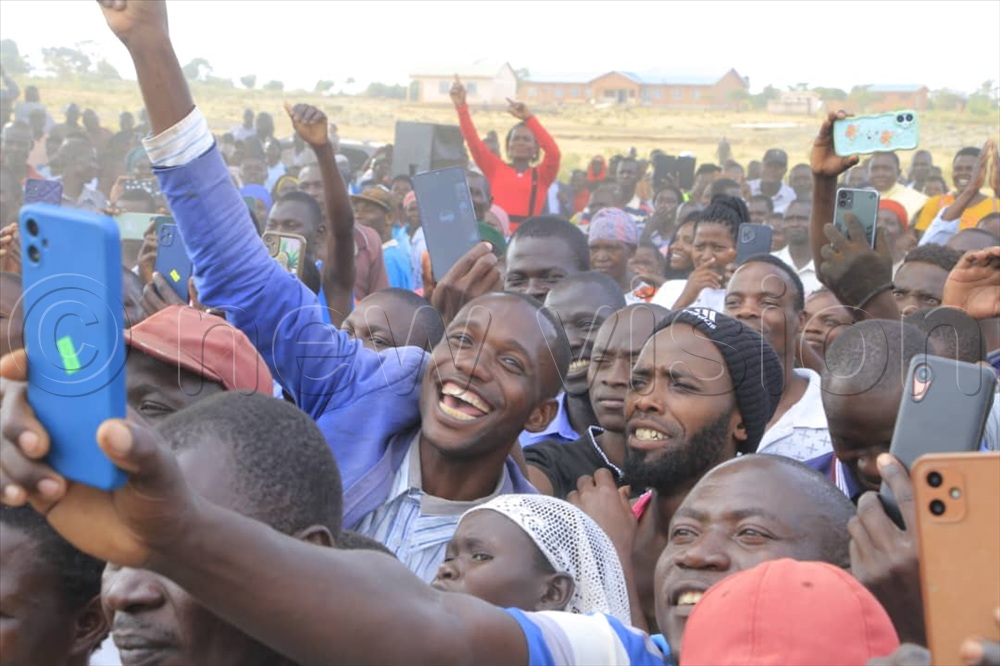FDC banks on Kadodi, Aganaga tunes to woo public for Nandala
Wherever FDC’s presidential flag-bearer, Nathan Nandala Mafabi, sets foot, the atmosphere is supercharged by Aganaga’s performances.
FDC’s presidential flag-bearer, Nathan Nandala Mafabi ( center) with Patrick Oboi Amuriat (left) dancing to Aganaga’s tunes while at Buvuma Island yesterday. ( Photos by Alffred Ochwo)
By John Musenze
Journalists @New Vision
________________
A few days into the 90-day 2026 General Election campaign trail, political rallies are increasingly taking on the feel of live concerts.
The Forum for Democratic Change (FDC) is among the political parties that have embraced this shift and is leaning not only on its manifesto but on music and culture too to connect with the electorate.
At the centre of this strategy is musician-turned-political voice Khalifah Aganaga, whose energetic performances have electrified FDC rallies from Buikwe to Buvuma in the first two days.
Wherever FDC’s presidential flag-bearer, Nathan Nandala Mafabi, sets foot, the atmosphere is supercharged by Aganaga’s performances.
His danceable tunes and powerful lyrics not only attract crowds, especially the youth, but also set the tone for political engagement.

Before Nandala takes the stage to outline his campaign promises, it’s Aganaga, dressed in blue and waving the FDC flag, who electrifies the crowd as he welcomes Nandala to show his stamina to his January 2026 voters. But he’s not just there to perform; he's there to preach what he calls the blue gospel.
“We cannot complain about poverty and unemployment, then dance for those who keep us there,” he declared during a rally in Buvuma District, drawing applause from the hundreds of turned-up voters.
“We must rise, and we must vote. And not just vote, but vote wisely by choosing the Key (FDC).”
In an exclusive interview, Aganaga, whose real name is Sadat Mukiibi, explained his alignment with FDC and Nandala Mafabi, despite the personal and professional risks of political involvement.
He states that he also wants to see Uganda's economy fixed when Ugandans have money in their pockets, as it is with the FDC 2026-2031 manifesto.
“I chose FDC because I believe in justice, equality, and a Uganda where every youth has a real chance, not just slogans,” he says.
“Nandala Mafabi is a man who understands the struggle from the grassroots. He listens. That’s rare with other politicians,” he told New Vision.
Aganaga himself was the FDC flag-bearer in the recent Kawempe North byelection, deepening his role in the party beyond music.
“This time, I’m not just singing for a politician, I’m part of the message. I’m using my platform to make the youth aware that their vote is their voice. We’ve danced long enough. Now, it’s time to decide who leads us.”
Kadodi and local talent as campaign tools
The FDC’s campaign trail is a mobile carnival of politics and culture. The party moves in a 50-car convoy, supported by four public address systems blasting music, speeches, and chants.
Traditional Kadodi music, with its fast-paced drumming and dancing, is a staple, especially popular among the youth and local communities.
Local entertainers join the trail, including drummers performing live Kadodi on foot and area musicians who are given a chance to entertain and sing praises of the incoming president, as believed by the FDC supporters.
The cultural showcase adds authenticity to the campaign and builds local pride.
“I came because of Aganaga, but I stayed to listen to Nandala. I had never really paid attention to politics before,” said Vicent Alogolwol, a 21-year-old who attended an FDC rally in Njeru.
The use of entertainers in Ugandan politics isn’t new. The ruling National Resistance Movement (NRM) is using artistes like Eddy Kenzo, Bebe Cool, and other parties like the National Unity Platform are using artistes too.
